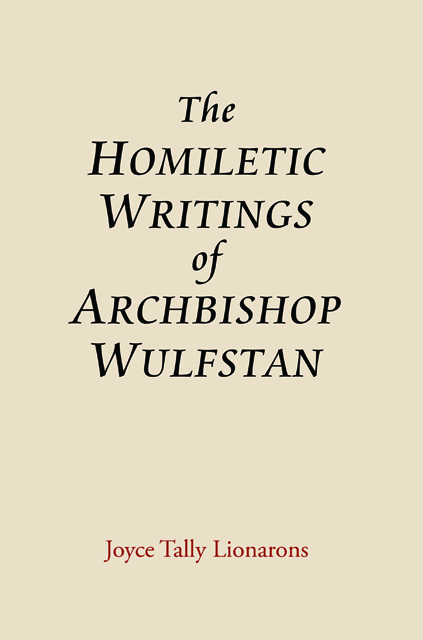Book contents
- Frontmatter
- Contents
- Acknowledgements
- Abbreviations
- Manuscript Sigla
- Introduction
- 1 Wulfstan and Wulfstan Manuscripts
- 2 Re-establishing the Wulfstanian Homiletic Canon
- 3 Wulfstan’s Eschatology
- 4 Salvation History and Christianity
- 5 Wulfstan as Archbishop
- 6 Sacramental Sermons
- 7 The Danish Invasions and the Sermo Lupi ad Anglos
- 8 Homilies Based on Legal Codes and the Institutes of Polity
- Bibliography
- Index
- Miscellaneous Endmatter
3 - Wulfstan’s Eschatology
Published online by Cambridge University Press: 18 February 2023
- Frontmatter
- Contents
- Acknowledgements
- Abbreviations
- Manuscript Sigla
- Introduction
- 1 Wulfstan and Wulfstan Manuscripts
- 2 Re-establishing the Wulfstanian Homiletic Canon
- 3 Wulfstan’s Eschatology
- 4 Salvation History and Christianity
- 5 Wulfstan as Archbishop
- 6 Sacramental Sermons
- 7 The Danish Invasions and the Sermo Lupi ad Anglos
- 8 Homilies Based on Legal Codes and the Institutes of Polity
- Bibliography
- Index
- Miscellaneous Endmatter
Summary
DURING HIS TENURE as bishop of London, Wulfstan wrote five homilies devoted wholly to the subject of the Final Days, one in Latin and four in Old English. A sixth, Secundum Marcum, may be dated internally as coming not long after the year 1000 and was probably written soon after Wulfstan became archbishop of York in 1002. The end of the world is a subject he returns to repeatedly throughout his homilies, most notably in the opening lines of the Sermo Lupi ad Anglos and in the thoroughly eschatological ending of Napier homily 50. It is little wonder that Mary Richards calls eschatology ‘a defining theme’ of Wulfstan's career. Yet since the publication of Malcolm Godden's influential article ‘Apocalypse and Invasion in Anglo-Saxon England’, it has become commonplace to assume that Wulfstan's thought underwent a major shift during the composition of the Sermo Lupi, during which he abandoned his belief that the Final Days would arrive in the near future in his comparison of the Danish invasions to the trials of the Israelites and to the Anglo-Saxon victory over the Britons in the Sermo Lupi. Such a change, if it happened at all, was short-lived, as Napier 50 makes clear. The evolution of Wulfstan's thought on the Final Days did not end with the last of the eschatological homilies or even with the Sermo Lupi, but continued to the end of his life.
Eschatological themes became pervasive throughout Old English literature at the same time that Wulfstan was composing his first series of eschatological homilies; in addition to Wulfstan's works, one may count several sermons by Ælfric and a large number of anonymous homilies, most notably Blickling homilies VII and X and Vercelli homilies II, IV, and IX. Milton McC. Gatch attributes the prevalence of such themes first to the fact that the Latin Fathers who exercised the most influence on Anglo-Saxon theology, Augustine of Hippo and Gregory the Great, emphasize eschatology in their writings, and second to the innate appeal of the concept of the Last Judgment to the Anglo- Saxons ‘as an appropriate extension of their own “heroic” picture of man's social nature and destiny … [by depicting] Christ, the proper Lord of all mankind, [leading] his faithful retainers to the most decisive and inevitable of victories’.
- Type
- Chapter
- Information
- The Homiletic Writings of Archbishop WulfstanA Critical Study, pp. 43 - 74Publisher: Boydell & BrewerPrint publication year: 2010

